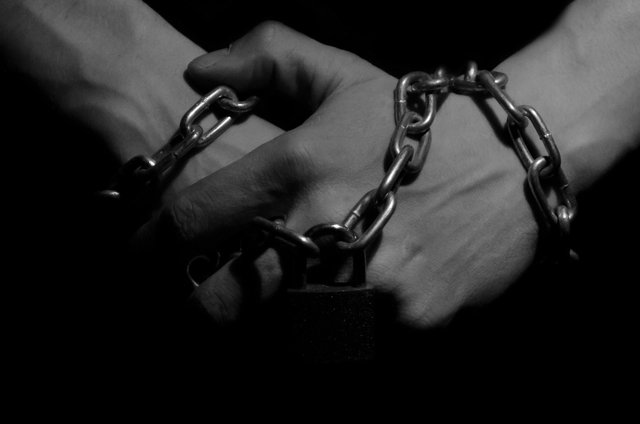Criminality with Respect to the State

["Hands in Chains," by George Hodan, taken from PublicDomainPictures.Net; this image is in the public domain.]
Although I have already made an addendum to my post, "Classical Liberalism has Won the Debate," upon review, I realize that there is still one piece of the argument that is missing. In that post ("Rights and Responsibilities as Inalienble Aspects of Consciousness"), I make the following claim: "When one is responsible, one is also free to choose to exercise choice within one's natural areas of responsibility, because no one else has any responsibility or right to make those choices for one. If they do so, they are infantilizing a responsible adult. That is criminal." While that is correct, I realize that it needs more elaboration, which I will address here. To see how this fits into my wider argument, please visit the other relevant posts, linked above. This argument integrates into that wider one. Also, due to personal scheduling limitations with respect to the amount of time I have to dedicate to Steemit on a daily basis, I will have to deliver this part of the argument in installments. This is the first installment of my inquiry concerning criminality.
What is criminality? The word has three implications: destructive social deviancy, wanton aggression against an innocent individual; or at least a level of aggression not validated by the level of dis-innocence of the aggressed against, and failure to comply with the fiat of the state. Of these three implications, however, only the last one (the state of being a scofflaw) is clear in such a way as to not raise further questions. If criminality is destructive social deviancy, then don't we first have to identify what the social good is, and square that with an argument that says that that supposedly criminal behavior materially violates it? And if so, isn't identifying the social good a matter of appealing to subjective social values? Given that, what happens to that understanding of criminality once we're in a state such that there is no consensus about what those values are? In such a case, that understanding of criminality must collapse, which means it cannot stand on its own. If criminality is unwarranted aggression, then what is it to be an aggressor, and what does it mean for that aggression to be unwarranted? Here, I think we can get at the essence of criminality apart from any ideas about the state or social norms which are outside of the thing itself, but that will require some elaboration.
So then is criminality merely a failure to comply with the legal fiat of the state, as the legal positivists might claim, or is it something far less arbitrary, having a meaning of its own, completely outside of the dialectic of the state? I think that, once you accept that the self and the ability to exercise responsibility are built-in features of consciousness, you'd have to say that it is both, but that it should be noted that in each of these two ways of thinking about it, it carries two distinct implications. In the context of the first case (the case of criminality being a failure to comply with state fiat - regardless of what that fiat might be), it is clear that criminality means: criminality with respect to a fiat. This means that the inherent validity of the category of being criminal within this dialectic is entirely dependent on the issued fiat in question. If you bring into question the ethical or legal validity of the fiat in question, then, immediately, the criminal act can only be said to be criminal with respect to that fiat, and not criminal in and of itself. The legal positivists are satisfied with this state of affairs because their doctrine is that there is no inherent moral validity to fiat or criminality - that those things are simply that which the state says they are, and so they are, provided they are willing to back up their opinion by applying objective consequences through force. I find this understanding of criminality to be, in a limited sense, correct, but incomplete. A law is a state fiat that is backed up by force, and scoffing that fiat makes you a criminal with respect to the state; but that does not satisfy the essence of criminality itself, which entirely independent of any fiat. In other words, it is possible for the state to issue a fiat that is entirely arbitrary from a moral standpoint, or else improper with respect to entitlement, in which case, being a criminal with respect to the state is in no way criminal in any essential sense.
This essay is continued here.
Congratulations @pjcomposer! You have completed some achievement on Steemit and have been rewarded with new badge(s) :
Click on any badge to view your Board of Honor.
For more information about SteemitBoard, click here
If you no longer want to receive notifications, reply to this comment with the word
STOPDo not miss the last announcement from @steemitboard!